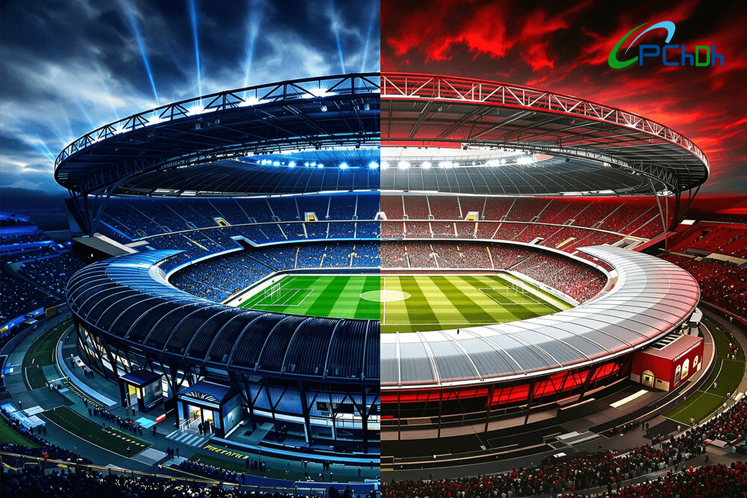The clash between Inter Milan and Estrella Roja is one of the most interesting matchups in European football. These two teams have different styles – Inter Milan plays with Italian tactics while Estrella Roja brings creativity from Serbia.
This matchup is a fascinating study in contrasts:
- Inter Milan: A Serie A giant known for disciplined defensive structures
- Estrella Roja: Serbia’s most decorated club, celebrated for dynamic attacking football
The importance of this game goes beyond just the 90 minutes on the field. Each time they play, it adds to a story that combines clever strategies with intense passion. Inter’s catenaccio-inspired approach clashes with Estrella Roja’s high-pressing style, creating a chess match of strategic adjustments.
The cultural impact can be felt throughout European football. San Siro’s impressive architecture hosts Inter’s tactical brilliance, while the Rajko Mitić Stadium vibrates with the raw energy of Eastern European football tradition. These matches highlight the beautiful diversity of European football – where various philosophies, playing styles, and fan cultures come together.
This article explores how this matchup represents the heart of continental competition, where strategic battles, exceptional talent, and fervent support combine to create unforgettable sporting events.
1. Historical Background
The first clash between Inter Milan and Estrella Roja took place in 1964, marking the beginning of a storied rivalry in European football. The initial encounter saw Inter Milan secure a narrow 2-1 victory at San Siro, setting the stage for decades of competitive matches.
The 1960s meetings showcased the emerging tactical revolution in Italian football, with Inter’s catenaccio system proving particularly effective against Estrella Roja’s attacking style, a concept explored in detail in Inverting the Pyramid: The History of Football Tactics. These early matches established a pattern of tactical chess matches that would define future encounters.
The rivalry gained new dimensions after Estrella Roja’s historic 1991 European Cup triumph. Their penalty shootout victory over Marseille in Bari, Italy, elevated the Serbian club’s status in European football. This achievement added extra weight to subsequent matches against Inter Milan, with Estrella Roja proving they could compete at the highest level.
Key historical encounters include:
- The 1981 UEFA Cup quarter-final, where Inter Milan advanced on away goals
- A memorable 1988 UEFA Cup clash featuring a 3-3 draw in Belgrade
- The intense 2005 Champions League qualifying round matches
The head-to-head record between these teams reflects their competitive nature, with both sides claiming significant victories. Inter Milan’s home record at San Siro shows their historical strength, while Estrella Roja’s performances at the Rajko Mitić Stadium demonstrate their ability to challenge European giants.
2. Tactical Styles of Both Teams
Inter Milan’s tactical approach embodies the essence of Italian football philosophy, built on a robust 3-5-2 formation. Their defensive setup creates an impenetrable wall, with three center-backs forming a solid foundation. The wing-backs provide width and attacking support, transforming seamlessly between defensive and offensive phases.
Estrella Roja’s 4-2-3-1 system prioritizes creative expression and fluid attacking movements. Their tactical blueprint emphasizes:
- High pressing from the front line
- Quick transitions through the middle
- Wide players cutting inside to create numerical advantages
Recent tactical battles between these teams highlight their contrasting approaches:
Inter Milan’s Key Tactics:
- Deep defensive block when out of possession
- Quick vertical transitions through the middle
- Wing-backs exploiting wide spaces
- Set-piece dominance
Estrella Roja’s Strategic Elements:
- Aggressive counter-pressing
- Creative movement in the final third
- Utilization of half-spaces
- Dynamic midfielder rotations
The clash of these distinct styles creates fascinating tactical chess matches. Inter’s disciplined positioning often forces Estrella Roja to adapt their creative patterns, while Estrella’s high press challenges Inter’s build-up play. This tactical duel adds an extra layer of intrigue to their encounters, making each match a unique strategic battle.
3. Key Players to Watch
Inter Milan
Lautaro Martínez
Inter Milan’s attacking prowess centers around Lautaro Martínez, whose clinical finishing and intelligent movement create constant threats.
Marcus Thuram
His partnership with Marcus Thuram has proven devastating, combining speed, power, and technical ability to break down defensive lines.
Nicolò Barella
In midfield, Nicolò Barella drives Inter’s tempo with his box-to-box dynamism and precise passing range. His ability to transition from defense to attack makes him a crucial component in Inter’s tactical setup.
Alessandro Bastoni
Key defensive matchups include:
- Inter’s Alessandro Bastoni – Known for his progressive passing and defensive positioning
Yann Sommer
The goalkeeper battle presents an interesting contrast:
- Yann Sommer (Inter) – Excels in shot-stopping and distribution
Estrella Roja
Osman Bukari
Estrella Roja’s creative spark comes from Osman Bukari, whose explosive pace and dribbling skills challenge any defense. His ability to cut inside from wide positions adds unpredictability to their attacking patterns.
Aleksandar Dragović
Key defensive matchups include:
- Estrella’s Aleksandar Dragović – Commands the backline with experience and tactical awareness
Omri Glazer
The goalkeeper battle presents an interesting contrast:
- Omri Glazer (Estrella) – Known for commanding his area and crucial saves in big matches
These individual battles often determine the flow of play, with each team’s tactical approach built around maximizing their stars’ strengths. The midfield duel between Barella and Estrella’s In-beom Hwang particularly shapes the match’s rhythm and possession patterns.
4. Match Atmospheres at San Siro and Rajko Mitić Stadium
The San Siro is like a grand cathedral of Italian football, with its iconic spiral towers and steep stands creating an intimidating cauldron of noise. On match days, the stadium transforms into a sea of black and blue, with the Curva Nord leading the passionate chants that echo through the 75,000-capacity arena. The synchronized movements of thousands of fans during the pre-match choreography create a spectacle that rivals the action on the pitch. This makes the San Siro one of the 50 best stadiums to visit in the world.
The Rajko Mitić Stadium, affectionately known as the “Marakana” by Red Star fans, offers a different but equally intense atmosphere. The 55,000-capacity venue becomes a fortress on European nights, with the Delije ultras turning the north stand into a pulsating wall of red and white. The stadium’s unique characteristics include:
- Continuous singing throughout the 90 minutes
- Pyrotechnic displays that paint the Belgrade sky
- Traditional Serbian chants that date back generations
- The famous “Hell of the Marakana” tifo displays
The clash of these two distinct atmospheres adds an extra layer of drama to Inter vs. Estrella Roja matches. The San Siro’s architectural grandeur contrasts with the raw passion of the Marakana, creating unique home advantages that have influenced numerous encounters between these teams.
5. Recent Encounters: A Mix of Tactical Battles and Individual Brilliance
The 2023/24 Champions League group stage matches between Inter and Estrella Roja showcased intense tactical battles. Inter’s 2-0 home victory highlighted their clinical finishing, with Lautaro Martínez’s precise header and Marcus Thuram’s powerful strike sealing the win.
The return fixture at Rajko Mitić Stadium delivered a dramatic 1-1 draw:
- Estrella Roja’s high-pressing strategy disrupted Inter’s build-up play
- A stunning long-range effort from Osman Bukari put the hosts ahead
- Federico Dimarco’s equalizer came from a well-executed set-piece routine
The 2021/22 Europa League meetings produced memorable moments:
- A 3-2 thriller at San Siro saw five goals in 30 minutes
- Estrella Roja’s tactical shift to a 3-5-2 formation surprised Inter
- Nicolò Barella’s masterclass performance earned him Man of the Match
These recent encounters reflect both teams’ evolution in playing style. Inter’s possession-based approach contrasts with Estrella Roja’s direct counterattacking system. The tactical chess match between managers has become increasingly sophisticated, with both sides adapting their strategies based on previous meetings.
The intensity of these matches continues to grow, with each team finding new ways to challenge their opponent’s tactical setup. Both sides have demonstrated their ability to adjust mid-game, creating unpredictable and exciting encounters.
6. Club Dynamics: Squad Depth, Financial Power, and Disciplined Defense
Inter Milan’s financial strength gives them a competitive advantage, with a squad worth over €500 million. They can afford to have multiple top-quality players for each position, which allows them to be flexible in their tactics and bounce back during times of injury. The club’s recruitment strategy involves bringing in experienced Serie A players alongside international talents, resulting in a well-rounded team.
Key differences in club dynamics:
1. Financial Resources
- Inter: Substantial transfer budget, high wage structure
- Estrella Roja: Limited budget, focus on youth development
2. Squad Management
- Inter: Deep rotation options, specialized role players
- Estrella Roja: Core group of starters, versatile utility players
Estrella Roja’s disciplined approach compensates for financial limitations through:
- Strategic player sales at peak value
- Strong academy pipeline
- Efficient scouting network in Eastern Europe
- Tactical adaptability with limited resources
The Serbian club’s defensive organization remains their primary strength, utilizing collective positioning and well-drilled set-piece routines. Their ability to maintain defensive stability while launching quick counterattacks creates problems for Inter’s possession-based approach.
Match outcomes often depend on how well Inter can break down Estrella Roja’s defense, while the Serbian side’s effectiveness in transition moments can exploit gaps in Inter’s aggressive positioning.
7. Cultural Significance Beyond the Pitch: Italy’s Tactical Heritage vs Eastern Europe’s Resilience
The Inter vs Estrella Roja matchup represents a fascinating cultural intersection in European football. Italy’s methodical approach to the game, embodied by Inter’s calculated strategies, stands in stark contrast to Eastern Europe’s resilient spirit, exemplified by Estrella Roja’s passionate style.
Italian Football Philosophy:
- Emphasis on tactical discipline
- Strong defensive foundations
- Strategic game management
- Business-like approach to player development
Eastern European Football Identity:
- Raw passion and determination
- Community-driven support
- Historical underdog mentality
- Youth development through limited resources
The clash between these teams transcends sport, reflecting broader societal values. Inter’s connection to Milan’s industrial heritage shapes their pragmatic approach, while Estrella Roja’s ties to Belgrade’s working-class roots fuel their fighting spirit.
This cultural divide manifests in fan behavior too. San Siro’s supporters display choreographed support with organized chants, while Rajko Mitić Stadium erupts in spontaneous, raw emotion. These differences create a unique atmosphere that captures the essence of European football’s diverse landscape.
The fixture serves as a reminder of football’s power to bridge cultural gaps. Despite their contrasting approaches, both clubs share a deep respect for tradition and a commitment to excellence, making each encounter a celebration of football’s unifying force.
Conclusion
The Inter vs Estrella Roja matchup shows how football can bring different cultures and traditions together. Every time these two famous clubs play, thousands of passionate fans come out, creating an exciting atmosphere that can be felt throughout European football.
The ongoing appeal of this matchup comes from its ability to showcase:
- Tactical Evolution: The combination of Italian precision and Eastern European flair
- Fan Culture: Two of football’s most passionate fanbases coming together
- Historical Legacy: A rivalry built on decades of memorable encounters
The matchup continues to captivate new generations of football enthusiasts, with social media engagement and ticket sales highlighting its growing popularity. As both clubs evolve and adapt to modern football demands, their encounters maintain the intensity and significance that first sparked this compelling rivalry.
These matches remain a highlight in the European football calendar, promising spectators a unique blend of tactical mastery, cultural heritage, and pure footballing drama.
FAQs (Frequently Asked Questions)
What is the historical significance of the Inter Milan vs. Estrella Roja football matchup?
The Inter Milan vs. Estrella Roja matchup holds a rich historical significance, dating back to their first encounter in the mid-1960s. The rivalry intensified after Estrella Roja’s 1991 European Cup win, marking it as a notable fixture in UEFA Champions League history and European football.
How do the tactical styles of Inter Milan and Estrella Roja differ?
Inter Milan is known for its defensive solidity, emphasizing disciplined defense and strategic positioning. In contrast, Estrella Roja showcases creative flair with dynamic attacking play. Their recent matches highlight key tactical battles between Inter’s structured defense and Estrella Roja’s inventive offense.
Who are the key players to watch in the Inter vs. Estrella Roja games?
Key players from both sides significantly impact the dynamics of the match. Inter Milan’s star players bring experience and tactical discipline, while Estrella Roja’s standout talents contribute creativity and resilience. Understanding their strengths and strategies is essential to appreciating this football rivalry.
What is the atmosphere like at San Siro compared to Rajko Mitić Stadium during these matches?
San Siro offers an electric atmosphere with passionate support from Inter Milan fans, creating an intense home advantage. Meanwhile, Rajko Mitić Stadium provides fervent home support for Estrella Roja, known for its vibrant and energetic crowd that fuels the team’s performance on home turf.
How have recent encounters between Inter Milan and Estrella Roja showcased tactical battles and individual brilliance?
Recent matches between these two teams have been marked by a blend of tactical depth and moments of individual brilliance. Both sides have engaged in strategic gameplay, with key players delivering standout performances that have influenced match outcomes significantly.
What cultural significance does the Inter vs. Estrella Roja rivalry hold beyond football?
Beyond the pitch, this rivalry represents a broader cultural clash within European football—Italy’s rich tactical heritage contrasts with Eastern Europe’s resilience embodied by Estrella Roja. This adds layers of meaning to the fixture, resonating deeply with fans and symbolizing diverse football cultures.


